 In a cornucopia of convergence, BT has announced their intention to use the Microsoft TV Internet Protocol Television (IPTV) Edition software platform to deliver TV over broadband in the UK. Internally within BT, the project is referred to as Project Nevis.
In a cornucopia of convergence, BT has announced their intention to use the Microsoft TV Internet Protocol Television (IPTV) Edition software platform to deliver TV over broadband in the UK. Internally within BT, the project is referred to as Project Nevis.
The Microsoft TV IPTV Edition software platform lets broadband network operators whizz high-quality video content and services down the wire to their customers using existing and next-gen broadband networks.
The platform delivers cost-effective and security-enhanced delivery of a whole gamut of pay-TV service offerings, including standard- and high-definition channels, on-demand programming, digital video recording, and interactive program guides.
There are extra consumer-pleasing gizmos in the package too, with features like instant channel-changing and picture-in-picture functionality using multiple video streams.
![]() Unlike most consumer pay-TV delivery systems, the Microsoft TV platform allows network operators to integrate the delivery of pay-TV services with other networked broadband services in the home such as PCs, telephones, game consoles, mobile devices and other gadgets.
Unlike most consumer pay-TV delivery systems, the Microsoft TV platform allows network operators to integrate the delivery of pay-TV services with other networked broadband services in the home such as PCs, telephones, game consoles, mobile devices and other gadgets.
Gavin Patterson, Group Managing Director of BT Retail slipped on his buzzword moccasins and danced a soft shoe shuffle to his Big Vision:
“BT and Microsoft share a common vision for converged entertainment in the home. TV over broadband services will play an important role in BT’s triple-play offering for consumers. Our approach of over-the-air broadcast and broadband-delivered video-on-demand, interactivity and enhanced support is the perfect solution and complements existing TV propositions already in the UK market. The combination of Microsoft’s best-in-class technology with BT’s 21st-century network will result in an incredibly exciting set of next-generation entertainment and communication services available to consumers across the UK.”
 As the sound of mutual backslapping threatened to reach ASBO-generating levels, Moshe Lichtman, corporate VP of the Microsoft TV division gushed:
As the sound of mutual backslapping threatened to reach ASBO-generating levels, Moshe Lichtman, corporate VP of the Microsoft TV division gushed:
“BT is a great example of one of the world’s leading network operators choosing Microsoft TV as the software platform for its digital TV and converged entertainment services.”
“We are very pleased to be working with such a well-respected and innovative operator as BT. Microsoft TV IPTV Edition will enable a full suite of integrated entertainment and communication services that will set the bar for what consumers will expect,” he added.
BT plan to start trials of the TV over broadband service in early 2006, with a commercial service expected to start in the summer of 2006.
 In a novel move to publicise the benefits of broadband for regional dwellers, the Welsh Assembly Government’s Broadband Wales Unit sent mobile Internet gateways scurrying around the valleys and mountains of lovely, lovely Wales.
In a novel move to publicise the benefits of broadband for regional dwellers, the Welsh Assembly Government’s Broadband Wales Unit sent mobile Internet gateways scurrying around the valleys and mountains of lovely, lovely Wales. The Get Smart – Get Broadband campaign revs up at Swansea Party in the Park this Sunday, where fans will be able to send messages (known in the vernacular as “shout outs”) from the Smart Cars to a giant onstage screen.
The Get Smart – Get Broadband campaign revs up at Swansea Party in the Park this Sunday, where fans will be able to send messages (known in the vernacular as “shout outs”) from the Smart Cars to a giant onstage screen.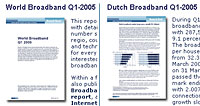 A new survey published today reveals that more Europeans than Americans possessed a broadband Internet connection in the first quarter of 2005, with hi-tech South Korea in danger of losing its global pole position.
A new survey published today reveals that more Europeans than Americans possessed a broadband Internet connection in the first quarter of 2005, with hi-tech South Korea in danger of losing its global pole position.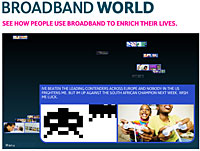 “Given the slow growth of South Korea, we expect that the top position, now held by South Korea, will change hands this year,” observed TelecomPaper director Ed Achterberg.
“Given the slow growth of South Korea, we expect that the top position, now held by South Korea, will change hands this year,” observed TelecomPaper director Ed Achterberg. Wi-fi enabled North Londoners can now gorge their connectivity needs with the announcement by Islington Council that its ‘Technology Mile’ has gone live.
Wi-fi enabled North Londoners can now gorge their connectivity needs with the announcement by Islington Council that its ‘Technology Mile’ has gone live. The council are anticipating that locals may use the free access to pay off council bills and are hopeful that the service may stimulate commercial activity in the area.
The council are anticipating that locals may use the free access to pay off council bills and are hopeful that the service may stimulate commercial activity in the area.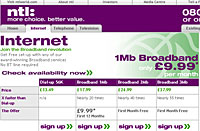 NTL’s claim that 300K broadband offer was “more than 5 times faster than standard 56K dial-up internet” has been happy-slapped down by the Advertising Standards Authority (ASA), who condemned it as being in breach of TV Advertising Standards Code.
NTL’s claim that 300K broadband offer was “more than 5 times faster than standard 56K dial-up internet” has been happy-slapped down by the Advertising Standards Authority (ASA), who condemned it as being in breach of TV Advertising Standards Code. The telecoms giant insisted that it was standard industry practice to refer to the speed of broadband only in terms of download speed and, to back up their case, readily snitched on a host of competitors making similar claims.
The telecoms giant insisted that it was standard industry practice to refer to the speed of broadband only in terms of download speed and, to back up their case, readily snitched on a host of competitors making similar claims.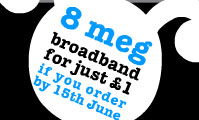 Bulldog Communications, the Internet and telecom group owned by Cable & Wireless, is rolling up its sleeves and shouting “Oy! Let’s be ‘aving you!” at its rivals as it doubles the speed of its broadband offering to a super-swifty 8 megabits-per-second from 4 megabits, and spread it across the UK.
Bulldog Communications, the Internet and telecom group owned by Cable & Wireless, is rolling up its sleeves and shouting “Oy! Let’s be ‘aving you!” at its rivals as it doubles the speed of its broadband offering to a super-swifty 8 megabits-per-second from 4 megabits, and spread it across the UK.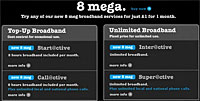 “Eight meg from Bulldog, with no download caps, gives customers the freedom to use the Internet as they wish,” he growled before retiring to his executive kennel.
“Eight meg from Bulldog, with no download caps, gives customers the freedom to use the Internet as they wish,” he growled before retiring to his executive kennel. Research from BT shows that the number of users connecting to the Internet via broadband has overtaken dial-up subscriptions for the first time, with 7.4 million broadband customers (including cable) now online.
Research from BT shows that the number of users connecting to the Internet via broadband has overtaken dial-up subscriptions for the first time, with 7.4 million broadband customers (including cable) now online. High speed connections are also good news to those selling goods and services online, with an explosive growth in the consumer market for buying media online, such as films, music and television.
High speed connections are also good news to those selling goods and services online, with an explosive growth in the consumer market for buying media online, such as films, music and television. Two million cable customers now enjoy broadband connectivity through NTL and Telewest.
Two million cable customers now enjoy broadband connectivity through NTL and Telewest. Cardiff vicar Reverend Kimber is hoping that by introducing wireless broadband access from the pews of his city centre church, more people will be encouraged to join his flock at St John’s Church.
Cardiff vicar Reverend Kimber is hoping that by introducing wireless broadband access from the pews of his city centre church, more people will be encouraged to join his flock at St John’s Church. After Kimber approached BT, the company agreed to fill in the gap in Cardiff’s wireless broadband network and fitted the church with its own Openzone node, providing access to surfers sitting in the corner of the north aisle at St John’s.
After Kimber approached BT, the company agreed to fill in the gap in Cardiff’s wireless broadband network and fitted the church with its own Openzone node, providing access to surfers sitting in the corner of the north aisle at St John’s. Like the spotty geek who turns up in the pub with a stunner on his arm, Bluetooth has confounded critics by reaching the significant milestone of five million Bluetooth units shipping per week.
Like the spotty geek who turns up in the pub with a stunner on his arm, Bluetooth has confounded critics by reaching the significant milestone of five million Bluetooth units shipping per week. “When you couple that with the recently announced collaboration between the Bluetooth SIG and UWB,” Foley continued, “Bluetooth technology will further reinforce its leading position far into the future. Even today, we expect this will have a positive impact in Bluetooth uptake.”
“When you couple that with the recently announced collaboration between the Bluetooth SIG and UWB,” Foley continued, “Bluetooth technology will further reinforce its leading position far into the future. Even today, we expect this will have a positive impact in Bluetooth uptake.” Seizing a convenient opportunity to squeeze in a bit of PR, Rosenberg added, “Already today, Nokia has introduced state-of-the-art mobile devices that allow data transmission using both high- speed cellular networks, WLAN hot spot access, and Bluetooth technology.”
Seizing a convenient opportunity to squeeze in a bit of PR, Rosenberg added, “Already today, Nokia has introduced state-of-the-art mobile devices that allow data transmission using both high- speed cellular networks, WLAN hot spot access, and Bluetooth technology.”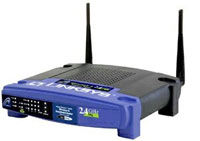 Despite prices being pushed downwards by fierce price competition, worldwide wireless LAN equipment revenue rose 20% to US$767.6 million (~£420m ~€610m) between the fourth quarter of 2004 and the first quarter of 2005.
Despite prices being pushed downwards by fierce price competition, worldwide wireless LAN equipment revenue rose 20% to US$767.6 million (~£420m ~€610m) between the fourth quarter of 2004 and the first quarter of 2005.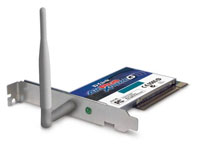 That’s a thumping great 37% increase in unit shipments, representing not-to-be-scoffed-at sales of 6 million.
That’s a thumping great 37% increase in unit shipments, representing not-to-be-scoffed-at sales of 6 million.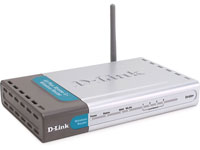 D-Link barged ahead of Cisco-Linksys to grab second place, with NETGEAR in fourth position.
D-Link barged ahead of Cisco-Linksys to grab second place, with NETGEAR in fourth position.